
On Oct. 30 a rare phenomenon in the history of Broadway will occur at the Gershwin Theatre: The international hit musical Wicked, which powerfully and emotionally delves into the back story of the witches of Oz, will celebrate its 10th anniversary on The Great White Way. Featuring a Tony-nominated score by Stephen Schwartz and a Tony-nominated book by Winnie Holzman, Wicked has been enchanting sold-out crowds for a decade, thanks to an excitingly tuneful score and a touching story that centers on the friendship between two not-so-wicked witches: the green-skinned Elphaba and the ever-"Popular" Glinda. Those roles, created to dazzling effect by Tony winners Idina Menzel and Kristin Chenoweth, are two of the meatiest currently available to young musical theatre actresses. The role of Elphaba is, perhaps, the most vocally challenging part for a belter since Andrew Lloyd Webber and Tim Rice's Evita came along in the late 70s. Since its debut in 2003, numerous actresses have had the chance to shine as the misunderstood Elphaba, who gets to belt out Schwartz's "The Wizard and I" and "Defying Gravity," and I've had the pleasure of chatting with many of these multi-talented, big-voiced gals. Excerpts from this decade of interviews with past Elphabas follow; that role, it should be noted, is currently being played by the gifted star of Dogfight and the recent revival of Godspell, Lindsay Mendez.
Click through to read excerpts from chats with the role's originator, Menzel, as well as subsequent Elphabas Eden Espinosa, Julia Murney, Stephanie J. Block, Nicole Parker, Shoshana Bean, Mandy Gonzalez and Willemijn Verkaik; interviews date from December 2003 to April 2013.
Idina Menzel, interview from December 2003
About the experience of playing San Francisco prior to bringing Wicked to Broadway:
Menzel: It was incredible and very important. I think that if you're doing a new musical, you want to have the opportunity to experiment and try things without the whole city of critics looking over your shoulder. And, the writers had that freedom to play, and they did. We tried different things, and we moved the order of scenes, and [they] wrote new lines and tried different costumes. It's a very important part of the process for a new musical.
About working with director Joe Mantello:
Menzel: I really owe it all to him. He challenged me to be better and really helped me discover who this woman was. When they are writing a new piece, they're not sure where they're coming from sometimes. The climate of who she is changes depending on a scene that's in or not, so you're constantly going, "Okay, wait. Now, I'm actually funny sometimes!" He just helped me figure out every moment and be specific and helped me bring out the essence of who she is. Her favorite moment in the show:
Menzel: I have several favorite moments; it depends on the day. I love singing the duet with Kristin [Chenoweth] at the end because I'm always in awe of how different our voices are, and yet, when we sing together in unison, how wonderfully they blend. That's an important statement for the characters and the people that we are in real life as well. I love singing the duet with Norbert [Leo Butz] because I get to be the ingenue. All the other roles I've had, I'm always the slutty supporting character [laughs], and now I get to sing the pretty love song, so I love doing that. I love flying and singing "Defying Gravity," which is my most favorite song in the show.
The message of Wicked:
Menzel There are a lot of messages. The two main ones — the story of the friendship of these two women and how they, through striving for truth in themselves, they really give a wonderful gift to each other and change each other forever. I think that that's important. I think that the idea that when someone's different from us, we tend to be threatened by them, and that we have to strive to look deeper than the surface. I think that's the other most important message.
To read the full interview, click here.
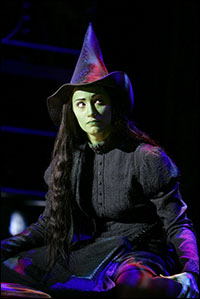 |
||
| Eden Espinosa |
||
| Photo by Joan Marcus |
About going from Elphaba standby to playing the role:
Espinosa: As a standby, you're required to maintain a certain amount of familiarity to the cast. You don't completely have creative and artistic freedom. You have to keep it in a certain parameter of what people are used to. When we were in rehearsals for when I [succeeded Idina in] January, the associate director had to keep telling me, "You don't have to do it that way anymore. You can do it your own way." [Laughs.] It was great. It was really freeing just to finally have the freedom to find my own Elphaba.
About the demands of the role:
Espinosa: I've never worked so hard in my life. [Laughs.] I remember being the standby [when] I had the good fortune of going on for almost three weeks. I remember at one point, right before [Elphaba] pops out of the trap at the very end, hanging on that ladder and looking at Idina's dresser and saying, "Idina Menzel is the hardest-working woman in show business!" [Laughs.] Because the role is just so, so demanding. It's not so much the singing — even though she does sing like ten songs — [but] she's [also] onstage every single scene except for the beginning of Act One and the beginning of Act Two. She's always onstage, she's always singing, she has heightened emotions, and it's physically demanding as well. It's just non-stop.
About the rewards of the role:
Espinosa: So many. As tired as I was all the time, I didn't care. . . . Doing eight shows a week, [there are some days when you think], "Honestly, I don't feel like doing it today," but the difference [with this part is] even though I had those days, the second I ran out on that stage, it was so fast and so fun and so easy to get lost in it. I just think [book writer] Winnie [Holzman] did a great job of writing this role. You take such an amazing journey, and it's a blessing to be in a hit. It really is. [The audience is] never disappointed. They're so gracious, and you have a packed house every single night, and that is not the norm. So I really tried to relish that every night.
Her favorite moment in the show for Elphaba:
Espinosa: There are so many. I have a different favorite every day. "I'm Not That Girl" I really enjoy. It has the softer, vulnerable side, the more human side. She kind of lets [the audience] in for a little bit. And I love "Popular." It's not even my number, but doing that number with Megan Hilty [is great]. Beside [Kristin] Chenoweth, it doesn't get much better than that. I really like being in that number and reacting to the Glinda, whoever she may be. It's just fun for me. To read the full interview, click here.
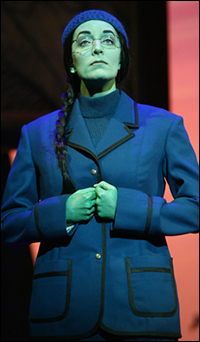 |
||
| Julia Murney |
||
| Photo by Joan Marcus |
About starring in a hit show:
This is the longest I've ever done a show — I've never been in a hit! I've been in cult favorites that closed and live on in the mind of those who happened to see them. To be in something that is sort of a machine unto itself and has these legions of fans built in, it's quite stunning and very interesting. When you do a show for an extended amount of time, I have found you kind of can't help but keep growing because after awhile you're going to lose your mind if you don't start exploring other things. There are people — George Lee Andrews is an old friend of the family, he's been in Phantom since it opened! God bless him, I don't know how he does it. That's extraordinary to me. The thing that always makes any show worthwhile — of course, it's great to play a role like Elphaba and kind of be a bit of a rock star — but in the end, what gets me through day in and day out, are the people. That's what lasts. The show eventually ends, or you leave, and it's the friendships you make, and everyone here is so welcoming, and the crew is so great. So, that's it — because you're all showing up, and you're all doing a two-show day on a Wednesday and a Saturday. And, yeah, I have to sing Fs, but that guy over there has to pull that fly, and that girl over there has to do that choreography — we all gotta do it. It's just nicer to feel like we're all in it together.
Most memorable stage door moment/fan comment experienced during her run in Wicked:
Julia Murney: I found myself consistently amazed at the numbers and passion of people at the stage door, both on tour (props to the sea of people every night in Atlanta) and on Broadway, and I am hard pressed to pick just one memory...One that comes to mind is the girl who showed up one night and said she was the "tattoo girl." She lifted her pant leg to show me a beautiful and rather large tattoo of a butterfly on her calf, with the words "defy gravity" on it — in my handwriting. She had asked for the writing while I was on tour, and I figured, well why not — practiced writing it about 500 times before sending it in, and now there it is permanently on her leg. Holy cow!
Funniest stage mishap that stands out from her Wicked run:
Murney: A few times, Kendra [Kassebaum] tossed her wand off stage during "Popular," and it would bounce off the tower and back onto the stage — her improv around that killed me every time. There was the time the monkey forgot to bring me the note about Fiyero in the final scene, so he just looked at me and mumbled, "Figure it out." I also have to give shout outs to both the tour and Broadway casts for taking such incredibly good care of me on nights when things were not going well health wise for me. They are salt of the earth, every one of them.
To read the full interview, click here.
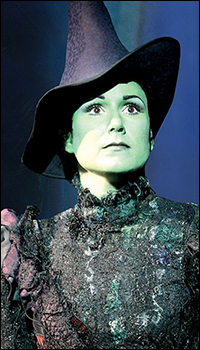 |
||
| Stephanie J. Block |
||
| Photo by Joan Marcus |
How she initially became involved with Wicked:
Block: It was kind of a random phone call. It was back in February of 2000. Stephen Schwartz and Winnie Holzman were out [in California] creating Wicked because Universal Pictures was looking to back it. Story goes, as it's been passed on to me, that Stephen Schwartz went to dinner with a nice group of friends and he said, "I'm not familiar with a lot of the musical theatre talent out here on the West Coast. Who would you guys recommend?" Luckily, my name came up several times. They referred him to me, and he literally left a voice message on my home phone and just said, "Stephanie, you don't know me, but my name is Stephen Schwartz. I've written Godspell…" and he started to give his resume, and my jaw just kept dropping on the floor! . . . Once I regained myself, I called him back. I think we met the next day or the day after that. I sang a couple songs for him, and he played me three tunes from the show and kind of taught me there on the spot.
Her disappointment in not getting to open the show:
Block: Oh, yeah, it was like someone punched me in the gut, quite frankly. But I understood. My heart didn't understand, but my head certainly did. When producers say, "Well, you have no Broadway credits and we're about to mount a $14 million production, it's just a huge risk," you want to fight your case and say, "I can do it." But Idina was nominated for a Tony before. She had been on this route of originating a Broadway role. They wanted that and they needed that. I, at that point, had to understand. But being with the original company, that was kind of my wake up to take the leap from Los Angeles to New York. [And, then] Wicked had been postponed. It was supposed to open in spring and then it got passed until the fall… I moved out to New York with every intention to be part of the original Wicked company and then had several months before it was to start, to kind of fill my time. So, I was auditioning and getting out there and really trying to get the lay of the land here in New York City. But Wicked was certainly [the impetus to] "get up and go try it and see what happens."
How she would describe Elphaba:
Block: I think it's not so much how I would describe her, [but] this is what I admire about her: her integrity, her sense of right and wrong and willingness to continue down a path which she feels is right and feels is important, regardless of who is going to throw obstacles at her. I admire her strength, I admire the vulnerability that she chooses to show only in moments of solitude or with people that she then begins to trust. There's so much about her, to me, that resonates with me as a person. I just feel like I'm really connected and know her very well.
Why she believes the show has become such a hit:
Block: It's that everybody feels like there is a piece of Elphaba inside of them. You want to root for her because of her integrity, her purpose, her meaning. There was a reporter that used a great quote, "Most people may come in thinking that they're Glinda and, for some reason, by the time they leave the theatre, they've adopted the character traits, or want desperately to adopt the character traits, of Elphaba." And I think that's very true. I also think that the history with "The Wizard of Oz" and how everybody feels like they know these characters and they've grown up with these characters, to see a completely different point of view and a different take on it is really such a great form of entertainment and really so very clever. It's amazing to me that, even after all these years that Wicked has been playing — and now it's intergalactic with the many companies they've got — that people still respond when they hear about the ruby slippers or they get the nuances of the storyline that connects "The Wizard of Oz" with Wicked. They're just in awe of how clever Winnie [Holzman] made this book. To read the full interview, click here.
 |
||
| Nicole Parker |
||
| Photo by Joan Marcus |
About the process of de-greenifying after the performance:
Parker: I come in, and I take a breath and go, "Oh, my God, I did it again. Okay, good, I'm alive!" So there's that moment. [Laughs.] The moment I realize I'm alive and I'm fine. And then I wash my hands first with this fancy wonderful peppermint soap that takes it right off your hands very quickly. So I do my hands first, then I do my lips and my eyes, and then I jump in the shower. Depending on how many other people are showering at the time, [it goes] from hot to cold, so there's times I'm like, "Waaaaah…" It's really kind of nice to get to shower after that show. It's actually exactly what I would want to do, to get into an enclosed, warm, safe-feeling place that has steam. It actually takes about 15 or 20 minutes. I just scrub heavily with a couple of different products, and then I'm out.
Her favorite moments in the show:
Parker: I have a couple. And, you know, they're going to change. My favorite moment is going to change, too. There are times when I say, "I love singing that song." And then the next day I'm like, "I do not like singing that song! That song was not my friend today. Why was that song not my friend today?" [Laughs.] So it changes. But some of my favorite parts I can't even explain why. For some reason, I really love — and not like it's so hard to understand, but it's maybe not what you would first think of — but I really love doing "Loathing" because it means that I got through "Wizard and I," so that makes me happy, and now I'm joined onstage by everyone. And I really, really like the moment where I get to be onstage with people. I love the energy, the rush of energy from "Loathing" as I'm running down the stage and the groups are coming at me and I'm chasing after them. It kind of gets me really, really warmed up into the show. This cast is so incredible, the energy they give out. I really love "Popular" because I love watching Alli [Mauzey] because she's hilarious! I love sitting . . . and knowing that now we're going to have a moment, we're going to have a scene, we're going to become friends, she's gonna be funny. . . . And I really like doing the dance — I like the "Elphaba Dance." I remember being, definitely, the awkward girl, and I like that moment because it's so triumphant, even though it's sort of sad, but at the same time it's not because you really get to see that she is an individual. There are a lot of things going on at that moment, and I enjoy all of them. That's all first-act stuff — the second act goes by so quickly. I'm sure I'll settle into it more and have more favorite moments!
Her thoughts about the success of the show around the world:
Parker: I think because it's a combination of the incredible production value — which is something that always remains with people. There are some amazing visual images that happen, but then it's not just that. On top of it, there are relationships. I think with any show, if you don't care about what happens to the people, you don't have a show. Whether it's a sitcom or a silly movie, it doesn't even matter. You have to care about the people. To me, that's what it is: People care about Elphaba, people care about Glinda, people care about Boq. You can hear it. I will listen to them and the way they react, and they're with us. They're totally with the story, so I think it is good storytelling. That is what keeps a show going on and on forever. It's not production value, it's not lighting, it's not costumes, it's not sound. And while the show has all of those elements, what it has at its core is the storytelling. I think if you look at anything that lasted a long time, you told a good story and you cared about what happened. That's what it is. It's a good story. It doesn't matter what age you are, who you are, where you're from. You're in.
To read the full interview, click here.
| |
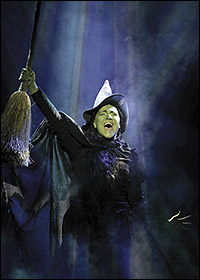 |
|
| Shoshana Bean | ||
| photo by Joan Marcus |
How she originally get involved with Wicked
Bean: I had gone in [to audition] a couple times for [Wicked]. I think I went in for Nessarose one time. I went in for the original standby. I actually got cast in the ensemble in the original company. I was in the ensemble at Hairspray at the time, and I was covering a bunch of roles, so I felt it was a lateral move. I was actually getting ready to leave Hairspray to work on my music. I just thought I didn't want to get involved in a whole other show, so I didn't end up doing it, and Kristy Cates got it, so it was kept in the family!
And then when Eden [Espinosa] was getting ready to leave to do Brooklyn, they called [and asked] if I wanted to come and standby. That way I could kind of work — be at work technically — but still work on my music. Then I fell in love with the role, and I [felt], "I really don't want to leave," and then I got to take over.
What she learned from playing the role:
Bean: What didn't I learn? I learned so much about myself as a person, as a performer. I learned about drawing boundaries, priorities. I learned even more vocal technique than I already did know. I think there's a challenge not only in learning that role, but for me the challenge was I had to figure out how to replace somebody, which is a really tricky situation. Having been in Hairspray and seeing people replace before and having been an understudy, I just did my best to go on. You bring a little bit of your own spin to the role, but basically you have to fill a hole and make sure the machine keeps running. You can't make it your own too much, so that's how I felt when I first took over for Idina [Menzel]. I didn't want to make waves. I just wanted to make sure that the machine kept running and that I didn't upset anything. And that only took me so far because I couldn't re-create her performance as much as I tried to. . . .At some point I had to do the work and make it my own. I learned how to do that. It was all sort of extraordinary circumstances and incredible learning experiences. I still think that the amount of work that [that role] is and the amount of endurance [it takes is like] running a marathon or lifting weights. You just get stronger and stronger the more you do it. Experiences and opportunities like that just make you better and stronger.
About the sisterhood that exists among the women who have played Elphaba:
Bean: There is! It builds as time goes by because we all share secrets on how we make it through. I remember Lisa Brescia called me when she first started. She's like, "How do you hit that low note in 'I'm Not That Girl'?" I was like, "Oh, sister, I had the worst time with that. Here's my trick." Or Kristy called me and said, "I had to finally call out at intermission. How did you deal with that?" They picked some of the strongest women out there — like Kristy [Cates] and Julia [Murney] and Stephanie [J. Block] and Eden — and they're some of the coolest chicks, too. Our paths cross very frequently. Eden and I just hiked last week, and Kristy's one of my best friends from way back, so it's a cool group of women. To read the full interview, click here.
| |
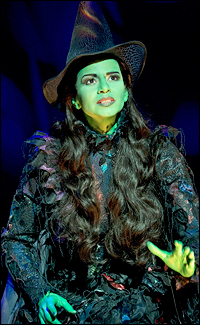 |
|
| Mandy Gonzalez | ||
| photo by Joan Marcus |
About going green each night:
Gonzalez: Well, it takes me about 45 minutes every day, and then it's about 16 minutes of scrubbing to get it off, and I've gotten pretty used to it. I mean, I have this incredible makeup artist, Craig Jessup, who does my makeup every night, so I don't really have to do anything. I just have to sit there and be patient while somebody paints my skin. It's been a little different with the winter just because it's cold, and so when he puts on the cold makeup, it gets really cold. [Laughs.] But it's been interesting just because it takes a while for your skin to get used to doing this, to putting this makeup on your face every night. For the two-show days, I have to wash my face and my body in between, just because Elphaba starts out a lot lighter in the beginning, and then she gets darker, so you have to go back to the lighter makeup. So that takes a while to get used to on your skin, but it's been fun. [Laughs.]
Her description of Elphaba:
Gonzalez: Elphaba is somebody that's had a very hard life, that hasn't had life make her jaded. She still has a lot of hope, and she's somebody that comes into the show with hope for new beginnings, and she kind of always feels that, but she's always been an outsider, so she's always had to build that hope on her own, because she's never had anybody there to say, "You can do it," so she's had to be that person to do that for herself. Through the show, she learns so much about trust, about trusting people and about friendship, and she's just a dreamer. She loves people, she loves animals, but it's really a great journey because I get to go through such an arc. I fall in love. She's the ultimate green girl. What can I say about Elphaba? [Laughs.] She's that person full of hope, that she puts all of her hope into things, even though things sometimes don't work out... She still has hope that there's something better for the future, and I think that that's a great quality to have.
What it's like to fly at the Gershwin:
Gonzalez: You know, the flying is really awesome. It's just interesting. I mean, I know they don't want me to give away too many secrets, but it was really interesting because when you're singing and you're rehearsing, you sing these big notes, and as a singer, I just take it from the ground, and I plant myself in and I get all my singing down. I remember when I first got onto the flying contraption, I realized that I can't really move anywhere. I can't move my legs, I can't do anything like that, so one time I actually did, and I felt it. [Laughs.] … So I just have to stay put, and that's really interesting, because I just get to use my upper body and pretend like I'm flying with the broom, and it's really cool. Once you master it, it's a really amazing, amazing ride.
About the "green girl" network among the women who have done the role:
Gonzalez: I remember seeing Stephanie J. Block at a commercial audition, and she's like, "How are you? What are you doing? What are you doing? I can't believe you're out," and I'm just like, "Yeah! You know." [Laughs.] But it was nice to see her because I don't think that anybody really knows exactly what you have to go through except for other people that have played the part, and they know that it's individual for everybody, but it's nice to see somebody and go, "Oh, did this happen to you? Did you ever feel like this?" Everybody's ready to talk, so it's good. [Laughs.] To read the full interview, click here.
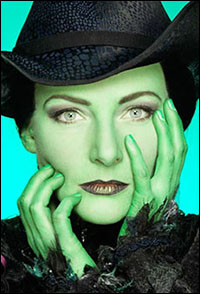 |
||
| Willemijn Verkaik |
The challenges of the role:
Verkaik: Well, you know, it's one of the toughest roles in musical theatre, I think, for a woman to play because it's a very emotional journey, but yet you also have to have the vocal range. The challenge is to every day do that again and have that stamina and be able to go through all of the emotional stages that she goes through. That's hard work, and you have to do that eight shows a week. It's a challenge. Because it's also so rewarding, and it makes the challenge really great to take on every night.
Favorite moment in the show for Elphaba:
Verkaik: Well, I mean, I couldn't not say a lot of the scenes are great, but I always enjoy a very little scene, which is between Fiyero, Glinda and Elphaba. It's the train station because it's so awkward, and I always enjoy that. It's just a tiny moment, but it's such a sweet moment, and I always love, love to do that.
Why she believes the musical is successful wherever it is produced:
Verkaik: Well, apart from that, the music is great, and the staging and everything is so fantastic. It's also the story that people can relate to. I get a lot of people writing me letters or after the show at the stage door telling me that they can recognize stuff in Elphaba in their own lives. People connect to that—to that feeling different—maybe one moment in their life or maybe for a longer period. And, I think that is something that everyone in every country—it doesn't matter where you come from—you can recognize that, and that's why I think it works so well.
To read the full interview, click here. [For tickets visit WickedtheMusical.]
Well, that's all for now. Happy diva-watching! E-mail questions or comments to [email protected].
PHOTO ARCHIVE: Celebrating Wicked on Broadway






















































































